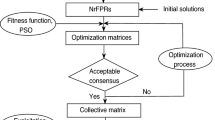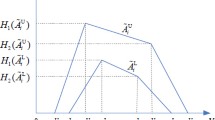Abstract
This paper presents a new method for group decision making using group recommendations based on interval fuzzy preference relations and consistency matrices. First, it constructs consistency matrices from interval fuzzy preference relations. Then, it constructs a collective consistency matrix, constructs a weighted collective preference relation, and constructs a group collective preference relation. Then, it constructs a consensus relation for each expert and calculates the group consensus degree for the experts based on the constructed consensus relations. If the group consensus degree is smaller than a predefined threshold value, then it modifies the interval fuzzy preference values in the interval fuzzy preference relations. The above process is performed repeatedly, until the group consensus degree is larger than or equal to the predefined threshold value. Finally, based on the group collective preference relation, it calculates the score of each alternative. The larger the score of the alternative, the better the preference order of the alternative. The proposed method can overcome the drawbacks of the existing methods for group decision making using group recommendations.
Access this chapter
Tax calculation will be finalised at checkout
Purchases are for personal use only
Preview
Unable to display preview. Download preview PDF.
Similar content being viewed by others
References
Alonso, S., Chiclana, F., Herrera, F., Herrera-Viedma, E., Alcala-Fdez, J., Porcel, C.: A consistency-based procedure to estimate missing pairwise preference values. International Journal of Intelligent Systems 23(1), 155–175 (2008)
Alonso, S., Herrera-Viedma, E., Chiclana, F., Herrera, F.: A web based consensus support system for group decision making problems and incomplete preferences. Information Sciences 180(23), 4477–4495 (2010)
Ben-Arieh, D., Chen, Z.: Linguistic-labels aggregation and consensus measure for autocratic decision making using group recommendations. IEEE Transactions on Systems, Man, and Cybernetics – Part A: Systems and Humans 36(3), 558–568 (2006)
Chen, S.M., Lee, L.W.: Autocratic decision making using group recommendations based on the ILLOWA operators and likelihood-based comparison relations. IEEE Transactions on Systems, Man, and Cybernetics-Part A: Systems and Humans 42(1), 115–129 (2012)
Chen, S.M., Lee, L.W., Yang, S.W., Sheu, T.W.: Adaptive consensus support model for group decision making systems. Expert Systems with Applications 39(16), 12580–12588 (2012)
Chen, S.M., Lin, T.E., Lee, L.W.: Group decision making using incomplete fuzzy preference relations based on the additive consistency and the order consistency. Information Sciences 259, 1–15 (2014)
Herrera-Viedma, E., Alonso, S., Chiclana, F., Herrera, F.: A consensus model for group decision making with incomplete fuzzy preference relations. IEEE Transactions on Fuzzy Systems 15(5), 863–877 (2007)
Herrera-Viedma, E., Chiclana, F., Herrera, F., Alonso, S.: Group decision-making model with incomplete fuzzy preference relations based on additive consistency. IEEE Transactions on Systems, Man and Cybernetics-Part B: Cybernetics 37(1), 176–189 (2007)
Herrera-Viedma, E., Herrera, F., Chiclana, F.: A consensus model for multiperson decision making with different preference structures. IEEE Transactions on Systems, Man and Cybernetics-Part A: Systems and Humans 32(3), 394–402 (2002)
Herrera-Viedma, E., Martínez, L., Mata, F., Chiclana, F.: A consensus support system model for group decision-making problems with multigranular linguistic preference relations. IEEE Transactions on Fuzzy Systems 13(5), 644–658 (2005)
Lee, L.W.: Group decision making with incomplete fuzzy preference relations based on the additive consistency and the order consistency. Expert Systems with Applications 39(14), 11666–11676 (2012)
Liu, F., Zhang, W.G., Wang, Z.X.: A goal programming model for incomplete interval multiplicative preference relations and its application in group decision-making. European Journal of Operational Research 218(3), 747–754 (2012)
Mata, F., Martinez, L., Herrera-Viedma, E.: An adaptive consensus support model for group decision-making problems in a multigranular fuzzy linguistic context. IEEE Transactions on Fuzzy Systems 17(2), 279–290 (2009)
Perez, I.J., Cabrerizo, F.J., Herrera-Viedma, E.: A mobile decision support system for dynamic group decision-making problems. IEEE Transactions on Systems, Man and Cybernetics-Part A: Systems and Humans 40(6), 1244–1256 (2010)
Tapia-García, J.M., del Moral, M.J., Martínez, M.A., Herrera-Viedma, E.: A consensus model for group decision making problems with linguistic interval fuzzy preference relations. Expert Systems with Applications 39(11), 10022–10030 (2012)
Wu, J., Li, J.C., Li, H., Duan, W.Q.: The induced continuous ordered weighted geometric operators and their application in group decision making. Computers and Industrial Engineering 56(4), 1545–1552 (2009)
Wu, Z., Xu, J.: A concise consensus support model for group decision making with reciprocal preference relations based on deviation measures. Fuzzy Sets and Systems 206, 58–73 (2012)
Xu, Z.: Consistency of interval fuzzy preference relations in group decision making. Applied Soft Computing 11(5), 3898–3909 (2011)
Xu, G.L., Liu, F.: An approach group decision making based on interval multiplicative and fuzzy preference relations by using projection. Applied Mathematical Modelling 37(6), 3929–3943 (2013)
Author information
Authors and Affiliations
Editor information
Editors and Affiliations
Rights and permissions
Copyright information
© 2014 Springer International Publishing Switzerland
About this paper
Cite this paper
Chen, SM., Lin, TE. (2014). A New Method for Group Decision Making Using Group Recommendations Based on Interval Fuzzy Preference Relations and Consistency Matrices. In: Ali, M., Pan, JS., Chen, SM., Horng, MF. (eds) Modern Advances in Applied Intelligence. IEA/AIE 2014. Lecture Notes in Computer Science(), vol 8481. Springer, Cham. https://doi.org/10.1007/978-3-319-07455-9_33
Download citation
DOI: https://doi.org/10.1007/978-3-319-07455-9_33
Publisher Name: Springer, Cham
Print ISBN: 978-3-319-07454-2
Online ISBN: 978-3-319-07455-9
eBook Packages: Computer ScienceComputer Science (R0)




